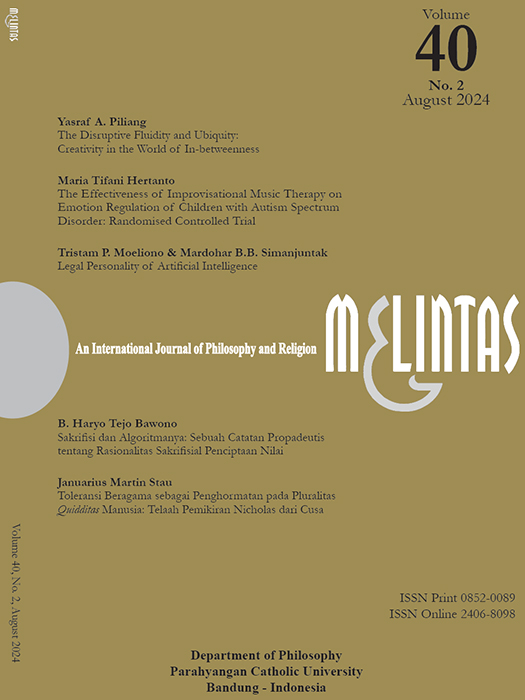
About the Journal
Print ISSN 0852-0089 Online ISSN: 2406-8098
MELINTAS An International Journal of Philosophy and Religion, is published thrice yearly by the Centre for Philosophy and Religious Studies (CPCReS), Faculty of Philosophy, Parahyangan Catholic University, Bandung, Indonesia. MELINTAS has been internationally indexed by EBSCO since 2015 (https://www.ebsco.com/m/ee/Marketing/titleLists/hsi-coverage.htm).
'Melintas' is an Indonesian word, literally means "to move across" or "to pass over". The journal uses it in the sense of "moving across the border of horizons" and "passing over the limits of mind" so as to find ever new ideas and possibilities of understanding life and humankind.
Current Issue

Emancipatory thinking refers to intellectual frameworks and ideologies focused on freeing individuals or groups from diverse forms of oppression, whether social, political, economic, or cultural. Rooted in critical theory, these ideas emphasize the importance of agency, autonomy, and equality, challenging the existing structures that perpetuate inequality and marginalization. These often call for a transformation of consciousness and societal structures, empowering persons and communities to challenge the status quo and propose a reliable solution.
In this edition, we provide critical reflections that aim to deepen our understanding of key issues, potentially enriching discussions on the evolving dynamics of the world. The first article suggests a method to bridge the gap between ‘high-brow’ and ‘low-brow’ art forms and lifestyles. The author argues that bridging these extremes requires dismantling the conceptual divide between them. The article concludes that the approaches proposed by Deleuze-Guattari and Paul Virilio are well-suited to the fluidity of a non-dichotomic world marked by ubiquitous computing (UC) and the Internet of Things (IoT). The second article addresses the profound absence of self-awareness in children with autism spectrum disorder (ASD). The author explores the potential of music as a means to alleviate this disorder. The findings align with the theoretical framework proposed by Patricia Churchland concerning the role of auditory phenomena in perception building. The third article explores the overlooked issue of non-human legal subjects, specifically artificial intelligence approaching Artificial General Intelligence (AGI). As virtual and augmented reality increasingly influence human lives, ignoring their impact risks significant mistreatment, neglect and even harm. The authors conclude that traditional legal frameworks must be adapted to address the evolving “the digital living space” of the metaversal era. The fourth article seeks to re-emphasise the importance of sacrifice and sacrificial actions as central to defining one’s existence. After thoroughly examining key sources on sacrifice across various categories, the author concludes that dismissing the vital role of sacrifice based on pseudo-rationality and mere assumptions is illogical. The fifth article explores a unified understanding of humanity through Nicholas Cusa’s quidditas as a conceptual framework. Historically, religious differences have often been misinterpreted as the cause of ongoing conflicts across civilizations. By applying a rational approach grounded in the dictum uno religio in rituum varietate, the author concludes that uniqueness can serve as a foundation for interreligious dialogues, helping to bridge gaps between different faith traditions.
Historically, emancipatory ideas and actions have played a pivotal role during periods of significant change. A central issue that arises is identifying the loci of emancipation. In light of the rapidly evolving world, a reconsideration of what holds the greatest importance becomes imperative. Answers to these questions are the next logical steps for a further and more humane world to live in.
Editor.

